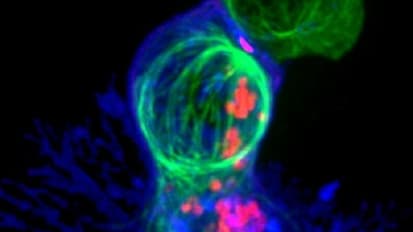Search Videos and More
 News
News
Study Pairs Two Forms of Immunotherapy in Patients with Advanced Kidney Cancer
T cells revved up to attack tumors are turned into an army of loiterers. Cells keenly attuned to signals of infection or disease fail to pick up the faint notes of cancer. A clinical trial led by Dana-Farber researchers is addressing both of these issues in patients who have undergone surgery for kidney cancer but have a high risk of recurrence. News
News
Study Finds Lower Mortality Rate for Men at High Risk for Death from Prostate Cancer Who Received Early Postoperative Radiation Therapy
In a large, international retrospective study, men at high risk for death from prostate cancer had a significant reduction in all-cause mortality if treated with radiation shortly after surgery Video
Video
Bladder Cancer Advances
Dana-Farber's Guru Sonpavde, MD discusses two studies with promising results. One study looks at pre-operative therapy, the other study compares an antibody-drug conjugate to chemotherapy in urothelial carcinoma. Video
Video
Choueiri and Motzer Chat on CheckMate-9ER and Other RCC Research
In our exclusive interview, Dr. Choueiri and Dr. Motzer discuss the clinical implications of the phase 3 CheckMate-9ER trial in advanced renal cell carcinoma and how to best use the combination in practice. Video
Video
New Treatments for Bladder Cancer Patients
Bladder cancer therapies, once very limited, now offer more options to treat patients than ever before. Dana-Farber Cancer Institute's Bladder Cancer Director, Guru Sonpavde, MD, details new treatments and research initiatives on the horizon for bladder cancer. News
News
Dana-Farber Research Leads to Better Understanding of the Immune System in Kidney Cancer
In the last two decades, immunotherapy has emerged as a leading treatment for advanced renal carcinoma cancer (more commonly known as kidney cancer). This therapy is now part of the standard of care, but it doesn’t work for all patients, and almost all patients, no matter how they respond initially, become more resistant to treatment over time. News
News
Immunotherapy Combination Improves Outcomes in Advanced Kidney Cancer
An immunotherapy agent combined with a tyrosine kinase inhibitor drug significantly improved progression-free survival and reduced the risk of death compared to a single agent treatment in advanced kidney cancer patients. Video
Video
Phase 2 Study of the Oral Hypoxia-Inducible Factor 2a (HIF-2a) Inhibitor MK-6482 in Combination with Cabozantinib in Patients with Advanced Clear Cell Renal Cell Carcinoma (ccRCC)
Kidney Cancer Research: HIF-2a drug combination shows promise in previously treated patients with clear cell renal cell carcinoma. Preliminary results presented by Toni Chouieiri, MD at ASCO #GU21 Video
Video
Impact of FGFR2/3 Activating Genomic Alterations on Response to Enfortumab Vedotin in Metastatic Urothelial Carcinoma (mUC)
Bladder cancer research: Impact of FGFR2/3 activating genomic alterations on response to enfortumab vedotin in metastatic urothelial carcinoma (mUC) Senior author: Guru Sonpavde, MD ASCO #GU21 Abstract 472 Video
Video
The Very Favorable Metastatic Renal Cell Carcinoma (mRCC) Risk Group: Data From the International Metastatic RCC Database Consortium (IMDC)
Kidney Cancer Research: Andrew Schmidt, MBBS presents a study that identifies a very favorable risk group in advanced kidney cancer patients treated with first-line therapy. ASCO #GU21 abstract 339. Video
Video
Post-Radical Prostatectomy (RP) Outcome for Patients with High-Risk Prostate Cancer Treated with Intense Neoadjuvant Hormone Therapy (NHT): Results of a Pooled Analysis of Contemporary Clinical Trials
Prostate cancer research: Mary-Ellen Taplin, MD details prostate cancer research findings that indicate decreased PSA relapse rate for patients with a favorable pathologic response to neoadjuvant hormone therapy prior to radical prostatectomy. Video
Video
Analysis of Plasma KIM-1 as a Biomarker for Recurrence Risk After Resection for Localized Renal Cell Carcinoma
Kidney cancer research: Analysis of plasma KIM-1 as a biomarker for recurrence risk after resection for localized renal cell carcinoma, presented by Vincent Wenxin Xu, MD at ASCO #GU21 abstract 342